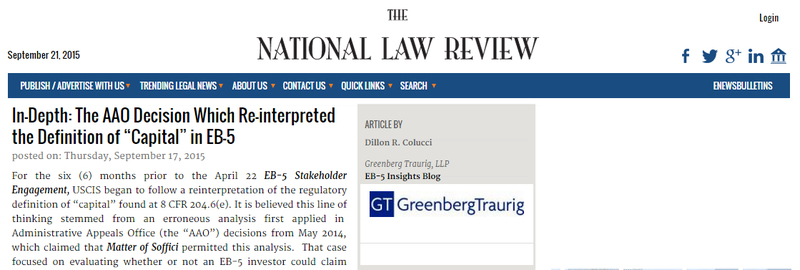In-Depth: The AAO Decision Which Re-interpreted the Definition of “Capital” in EB-5
For the six (6) months prior to the April 22 EB-5 Stakeholder Engagement, USCIS began to follow a reinterpretation of the regulatory definition of “capital” found at 8 CFR 204.6(e). It is believed this line of thinking stemmed from an erroneous analysis first applied in Administrative Appeals Office (the “AAO”) decisions from May 2014, which claimed that Matter of Soffici permitted this analysis. That case focused on evaluating whether or not an EB-5 investor could claim investment of the requisite capital by demonstrating the new commercial enterprise (the “NCE”) obtained a loan (in the name of the NCE) and use those loan proceeds to start-up its business.
The AAO quotes a section of that case which discusses how capital secured by assets of the NCE is specifically precluded from the definition of “capital” at 8 CFR 204.6(e). The AAO claims that in Matter of Soffici, because the AAO in that decision precluded cash obtained from a loan taken out in the name of the NCE on the basis of the definition of “capital” at 8 CFR 204.6(e) which states “…indebtedness secured by assets owned by the alien entrepreneur,” that all cash proceeds derived from a loan must be evaluated as indebtedness. This is an extraordinary leap from the facts of Matter of Soffici, since the cash proceeds of the loan claimed by the petitioner were actually the proceeds of a loan obtained by the NCE, not by the investor. The AAO in this decision then claims that because Matter of Soffici precluded cash proceeds taken out by the NCE as “capital” as if it were “indebtedness” and therefore all cash proceeds of a loan invested in an NCE must be evaluated under the Matter of Izummi and Matter of Hsuing standards for evaluating “promissory notes.” There are a number of logical inconsistencies with this argument. First, Matter of Soffici discounted cash proceeds obtained from a loan in the name of the NCE, and not the investor. Second, the requirements for promissory notes in Matter of Izummi and Matter of Hsuing deal with promises to pay, not actual tangible investments of cash. Third, if the AAO’s interpretation of Matter of Soffici accurately describes what the AAO intended with that decision it clearly contravenes the plain text of the regulation which lists “cash” and “indebtedness” as separate types of “capital,” and therefore clearly did not intend to cash proceeds derived from indebtedness to not fall under the guise of “cash.”
Lastly, even if we apply the AAO’s erroneous logic in this decision from May 2014, it doesn’t hold up under scrutiny with the actual text of 8 CFR 204.6(e). The regulation explicitly requires that when investing indebtedness (or in USCIS view – cash proceeds of a loan) the alien entrepreneur must be (A) personally and primarily liable and (B) that the assets of the new commercial enterprise upon which the petition is based are not used to secure any of the indebtedness. However, loans on a personal signature (i.e. unsecured loans); that is, loans secured by nothing more than an individual’s signature are secured in the same sense that a credit card is secured by any and all assets the credit card company can get its hands on of the individual whose name is on the credit card. This is consistent with the E-2 regulations at 9 FAM 41.51 N8.1-2 which expressly states “Only indebtedness collateralized by the alien’s own personal assets, such as a second mortgage on a home or unsecured loans, such as a loan on the alien’s personal signature may be included.” Thus, provided an investor has not secured the loan by the NCE, and provided the investor is still personally and primarily liable (which makes no mention of adequate securitization) for the loan (i.e. he or she is the signatory of the loan), the cash proceeds derived from such loan meet the regulatory definition of “capital.”
However, despite these AAO decisions being non-binding and non-precedent, USCIS appears to have followed this decision down to the exact language in their adjudications of cases involving indebtedness. Many notices of intent to deny and requests for evidence issued by USCIS include the exact wording and phasing from the May 2014 AAO decision. Finally, on April 22, 2015, USCIS issued written guidance confirming this erroneous interpretation. However, it appears this interpretation may be softening, as similar to our recent work in shareholder loan cases, we have received a number of I-526 Petition approvals where USCIS in these cases. Likewise, federal court actions have been filed by investors suing USCIS for this ultra vires change in policy.
http://www.natlawreview.com/article/depth-aao-decision-which-re-interpreted-definition-capital-eb-5
Mentions
States
- New York
Videos





Subscribe for News
Site Digest
Join Professionals on EB5Projects.com →
Securities Disclaimer
This website is for informational purposes only and does not constitute an offer or solicitation to sell shares or securities. Any such offer or solicitation will be made only by means of an investment's confidential Offering Memorandum and in accordance with the terms of all applicable securities and other laws. This website does not constitute or form part of, and should not be construed as, any offer for sale or subscription of, or any invitation to offer to buy or subscribe for, any securities, nor should it or any part of it form the basis of, or be relied on in any connection with, any contract or commitment whatsoever. EB5Projects.com LLC and its affiliates expressly disclaim any and all responsibility for any direct or consequential loss or damage of any kind whatsoever arising directly or indirectly from: (i) reliance on any information contained in the website, (ii) any error, omission or inaccuracy in any such information or (iii) any action resulting therefrom.



